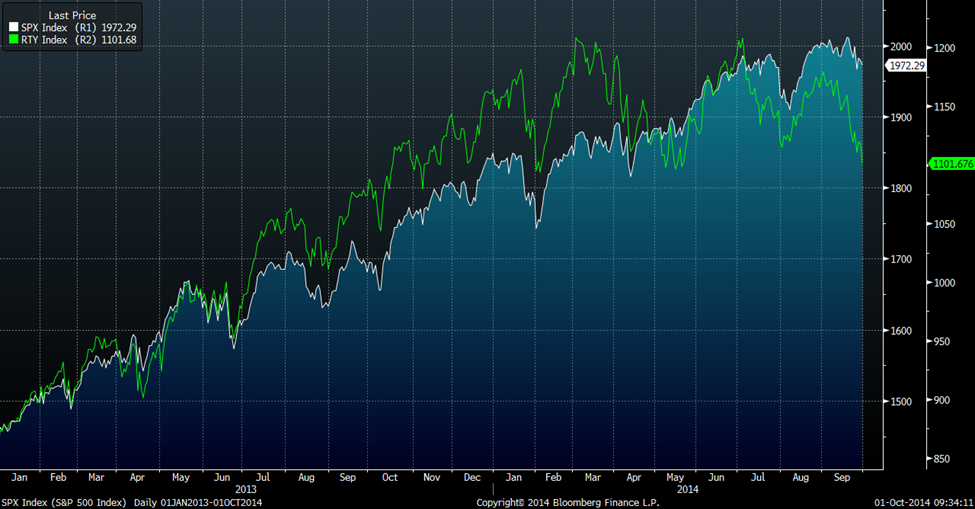
Market Update for the Quarter Ending September 30, 2014
Presented by Manning Wealth Management
For U.S. markets, a weak month blunts quarterly gains
September was weak for U.S. markets. The Dow Jones Industrial Average lost 0.23 percent, the S&P 500 Index declined 1.40 percent, and the Nasdaq dropped 1.90 percent. In fact, although all three indices were up for the quarterthe Dow up 1.87 percent, the S&P 500 up 1.13 percent, and the Nasdaq up 1.93 percentSeptember’s losses cut gains at least in half.
Weakness was driven by fundamental and technical factors. Per FactSet, at September’s end, the estimated earnings growth rate for the third quarter was 4.7 percentalmost half the estimated rate of 8.9 percent in early July.
Technical factors that led to weakness included the approach of the S&P 500 to the 2,000 level and the fact that gains in the indices have increasingly been driven by gains in the share prices of larger companies. Stocks of smaller companies have underperformed for the month and quarter (see chart), suggesting that investors are becoming more risk-averse.
Price History, S&P 500 (Large-Caps) and Russell 2000 (Small-Caps) Indices,
January 2013September 2014
Source: Bloomberg
International markets suffered more than U.S. markets. The MSCI EAFE Index declined 3.84 percent for September on growing political and economic worries in Europe and the U.K. For the quarter, it was down 5.88 percent.
Emerging markets suffered, too, with the MSCI Emerging Markets Index down a significant 7.59 percent in September. China’s growth continued to slow, with housing prices decreasing in many cities and the government refusing to step in with stimulus. The drop reversed gains in the previous two months, leading to a 4.33-percent loss for the quarter.
Fixed income also suffered in September, with the Barclays Capital Aggregate Bond Index declining 0.68 percent, taking the quarter to a small 0.17-percent gain. Declines were driven by a rise in interest rates in September. For the quarter, rates were relatively stable.
U.S. economy continues to do well
Good news for the U.S. economy continued in September. Positive data points included rising auto sales and home prices, a double-digit drop in job cuts, and a nine-year high in the nonmanufacturing business survey. Retail sales and consumer confidence rose strongly. Another positive factor was the upward revision of second-quarter economic growth, to 4.6 percent from 4.2 percent.
The weak part of the month was job gains, which were well below expectations. But other employment metrics were strong, suggesting that gains would likely rise again.
The Federal Reserve ratified the ongoing recovery by further reducing its bond purchases and indicating that it expected to stop them in October. The removal of stimulus, along with an upward revision of the Fed’s estimate of future interest rates, contributed to September’s rate rise.
Geopolitical turbulence hits markets
The big international story in September was the Scottish independence referendum. Although voted down, the possibility of succession led markets to consider that other areas of Europe could be affected. Rising uncertainty drove equity prices down.
Oil prices decline despite ISIS
Oil prices declined slightly in September, and substantially for the quarter, due to a drop in demand and an increase in supply. The U.S., expected to become the world’s largest oil producer shortly, is moving into a price-setting position, which should help moderate future prices.
Investors pull back as risks rise
September is historically a difficult month, and that has been the case this year, particularly in international markets. Although the U.S. has suffered relatively little damage so far, we are exposed to growing geopolitical and economic turbulence. Markets can be expected to adjust to the lower growth rates, and companies can be expected to adjust expectations.
We could see continued market price adjustments as investors modify risk exposures. But investors with properly diversified portfolios should be prepared to take a potential downturn in stride. On balance, the U.S. remains well positioned, and U.S. investors should continue to participate in the growth.
All information according to Bloomberg, unless stated otherwise.
Disclosure: Certain sections of this commentary contain forward-looking statements that are based on our reasonable expectations, estimates, projections, and assumptions. Forward-looking statements are not guarantees of future performance and involve certain risks and uncertainties, which are difficult to predict. Past performance is not indicative of future results. Diversification does not assure a profit or protect against loss in declining markets. All indices are unmanaged and investors cannot invest directly into an index. The Dow Jones Industrial Average is a price-weighted average of 30 actively traded blue-chip stocks. The S&P 500 Index is a broad-based measurement of changes in stock market conditions based on the average performance of 500 widely held common stocks. The Nasdaq Composite Index measures the performance of all issues listed in the Nasdaq Stock Market, except for rights, warrants, units, and convertible debentures. The Russell 2000® Index measures the performance of the 2,000 smallest companies in the Russell 3000 Index. The MSCI EAFE Index is a float-adjusted market capitalization index designed to measure developed market equity performance, excluding the U.S. and Canada. The MSCI Emerging Markets Index is a market capitalization-weighted index composed of companies representative of the market structure of 26 emerging market countries in Europe, Latin America, and the Pacific Basin. It excludes closed markets and those shares in otherwise free markets that are not purchasable by foreigners. The Barclays Capital Aggregate Bond Index is an unmanaged market value-weighted index representing securities that are SEC-registered, taxable, and dollar-denominated. It covers the U.S. investment-grade fixed-rate bond market, with index components for a combination of the Barclays Capital government and corporate securities, mortgage-backed pass-through securities, and asset-backed securities.
###
Manning Wealth Management is a financial advisor and consultant office located at 2550 5th Ave Suite 800 San Diego, CA 92103. They offer securities and advisory services as an Investment Adviser Representative of Commonwealth Financial Network®, Member FINRA/SIPC, a Registered Investment Adviser. They can be reached at 619-237-9977 or at www.manningwm.com
Authored by the Investment Research team at Commonwealth Financial Network.
© 2014 Commonwealth Financial Network®





